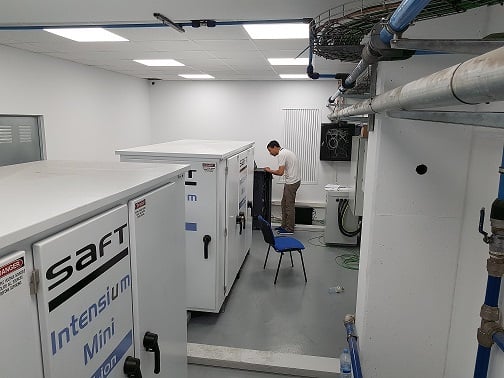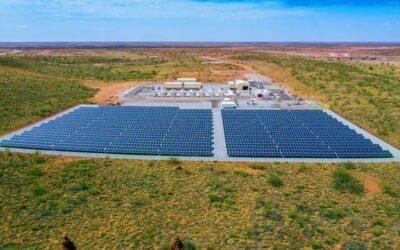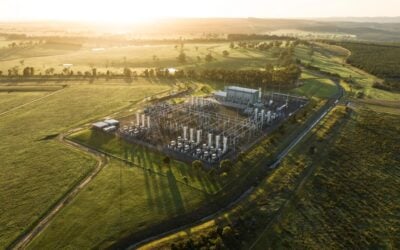
Saft delivers 400kWh for Spanish C&I project
Advanced battery solutions company Saft has just announced details of a project the company executed in Spain, installing battery energy storage systems to streamline energy costs and efficiency at a refrigeration company.
Spain’s stalled solar market has shown some recent signs of returning to life, while a small handful of energy storage projects, including a 20MW system from France’s Electro Power Systems (recently acquired by ENGIE), have got underway.
Enjoy 12 months of exclusive analysis
- Regular insight and analysis of the industry’s biggest developments
- In-depth interviews with the industry’s leading figures
- Annual digital subscription to the PV Tech Power journal
- Discounts on Solar Media’s portfolio of events, in-person and virtual
Saft said its customer, EXKAL, a maker of refrigeration units and supplier to the sector, ordered two lithium battery energy storage systems to pair with 11,270kWp of existing rooftop PV generation. The systems, each of 50kW / 200kWh, will help the EXKAL facility reduce peak demand portions of its energy bills and increasing the portion of power used at the site that comes from self-consuming rooftop-generated PV, further reducing costs.
Manufactured at Saft’s facilities in Florida, the Intensium Mini E devices, the smaller version of the company’s grid-scale containerised storage, should reduce EXKAL’s power bills by around 8%. The project was actually completed in April last year, but the respective partners held off from the announcement until this week. The Intensium Mini E units use Saft’s Synerion lithium battery modules and meets local grid code requirements.
The project, at an EXKAL manufacturing facility in Navarra, northern Spain, is supported by the STORY programme, a scheme funded by the European Union’s Horizon 2020 research and innovation framework. STORY is hosting eight demonstrations of energy storage tech across Europe. Saft was acquired by fossil fuel industry giant Total in late 2016.
Hawaii Electric’s Amber Kinetics flywheel goes into operation
A ground-breaking ceremony has taken place in Hawaii for a demonstration project utilising flywheel energy storage technology to power residential properties.
Utility Hawaiian Electric announced earlier this week that an 8kW / 32kWh flywheel system manufactured, supplied and installed by Amber Kinetics has gone into operation – the company’s first US project to be delivered on a commercial basis.
With four hours of energy storage duration, an 8kW unit weighs five tonnes and can power around 25 homes for an hour. It uses controls and communications developed by Amber Kinetics and the utility. Hawaiian Electric said technical field data from the project will be used to inform future decisions on energy storage.
The flywheel is expected to experience little degradation despite multiple duty cycles, losing none of the energy it stores as rotational kinetic energy. The 98%-steel device can be fully recycled once its expected 30-year lifetime in the field is over. The project is supported by Elemental Excelerator, which supports start-ups that aim to improve quality of life and benefit whole communities, selecting 12-15 companies to support each year.
Hawaii Electric and Amber Kinetics put together the plan to test the technology in 2016.
Varta launches residential units in Australia
Consumer and industrial battery company Varta, which has made recent moves into Europe’s stationary battery energy storage market, has launched its products in the high demand market of Australia.
Having already launched in its home market of Germany and four other national territories, most recently Italy and the UK, Varta is making its Varta Pulse storage system available across the whole of Australia. A little smaller than some devices from other manufacturers in Australia, the Pulse comes in two models: Pulse 3, a 3.3kWh system and Pulse 6, which is 6.5kWh capacity.
Varta claimed the plug n play capabilities of Pulse mean the systems can be installed in around half an hour. Part of its selling point is the compactness, with Pulse 3 weighing just 45kg and Pulse 6 at 65kg. By way of comparison, Tesla’s Powerwall 2, with 13.5kWh capacity, weighs around 125kg.
“The Australian market offers immense potential and holds great growth opportunities for us,” Gordon Clements, general manager for residential energy storage at Varta said.
“The storage systems are compact and handy and yet of high quality. Perfect for anyone who not only wants to generate energy themselves, but also wants to store it and consume it whenever they need it.”
Watch a 2016 video interview from our archives with Varta's Michael Gopp, talking about the energy storage market in Germany and Europe as the company launched its first line of commercially available residential and commercial storage systems.






